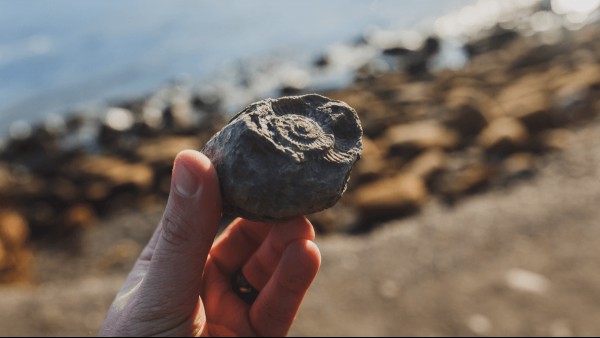What Should Humans Say To Extraterrestrials?
Congratulations! You’ve been chosen as the Representative of the Human Race™ to send a message into space. You have the opportunity to blast something

Words, like any living things, are born and can die. Well, “die” might not be the most apt term, but words definitely fall out of use given enough time. Some last quite a while, some evolve into other words and some simply vanish from existence. In certain rare cases, though, a word will almost disappear, but stick around in very specific circumstances. When that happens, they become fossil words.
Generally, fossil words stick around because of a common idiom. For example, you might be “champing at the bit” for something to happen. The word “champing,” though, is extinct outside of this one circumstance. You never “champ” any other item. Like a mosquito encased in amber, fossil words are stuck.
Surprisingly, fossil words are extremely common. We gathered together some of the most common ones and discovered what these words originally meant.
Phrase: champing at the bit (excited for something)
Definition: This is just a variation of “chomping.” Often, people will in fact say “chomping at the bit” instead, but this is considered an eggcorn, which is a language mistake often caused because someone has heard an idiom incorrectly.
Phrase: vim and vigor (full of life)
Definition: Energy, excitement. But you’d never say someone is full of just “vim.”
Phrase: kith and kin (friends and family)
Definition: a person’s friends, acquaintances and basically anyone you know who isn’t covered by “kin.” Kith has also found a second life as the name of a retail establishment.
Phrase: at loggerheads (in a heated, dead-locked dispute)
Definition: a foolish person. Today, the word only survives as the name of a certain breed of turtle, a certain breed of bird and a few locations in England. It’s not entirely clear how “at loggerheads” started referring to two people having a disagreement.
Phrase: just deserts (to get what one deserves)
Definition: what one deserves. Sometimes — but rarely — someone will refer to “deserts” without the “just,” yet they’re almost always a pairing. The fact that “deserts” (the comeuppance) is pronounced differently from “deserts” (the biome) leads many people to mistake it for “just desserts.”
Phrase: out of wedlock (in a state of not being married)
Definition: in a state of being married. This word fell out of fashion because it’s simple enough to say that someone is married or not. But the euphemistic phrase “a child born out of wedlock” (which is still frowned upon in many parts of the world) has kept this word alive.
Phrase: the whole shebang (all of it)
Definition: a set of circumstances. But no one really talks about anything except the whole shebang. This word also has an archaic meaning of “a hut,” which you also aren’t likely to hear.
Phrase: death knell (a sign of the end of something)
Definition: the sound of a funerary bell. Historically, people would literally ring a bell to alert the world that someone has died. Sometimes this was called a “passing bell” or a “death bell.” This isn’t a particularly common practice anymore, but it lives on in this idiom.
Phrase: by dint of (by means of)
Definition: force, power. At one point, this word could also be used interchangeably with “dent.”
Phrase: in high dudgeon (enraged)
Definition: a state of indignation. No one seems to be in low dudgeon anymore, though.
Phrase: hither and thither (all over the place), hither and yon (in disparate directions), come hither (come here, usually seductively)
Definition: toward this place. “Hither” is one of the rare fossil words that has survived in multiple different phrases. In most other contexts, “hither” is pretty easily replaced by “here,” which is similar but not the same. “Here” refers to an exact location, but “hither” refers to a direction toward an exact location.
Phrase: hoist by their own petard (to be destroyed by your own weapon)
Definition: a small bomb. “Hoist” also isn’t particularly common, and it means “to be raised” (usually by pulleys, but sometimes by a petard). Perhaps unsurprisingly, the works of William Shakespeare are the source of a number of idioms that hold fossil words. The phrase “hoist with his own petard” was originally used in a speech in Hamlet.
Phrase: kit and caboodle (the whole thing)
Definition: unlike most other words on this list, caboodle is a born fossil. That means it never had any meaning outside of this specific phrase. That’s because the phrase was taken fully from Middle Dutch, which has the phrase kitte en boedel. It was originally adopted as “kit and boodle,” but in the interest of alliteration it was changed to “kit and caboodle.”
Phrase: beyond one’s ken (outside of one’s knowledge)
Definition: a person’s knowledge. While this word is not very common in English, you’ll find it in Scots as a verb meaning “to know.”
Phrase: with bated breath (awaiting eagerly or anxiously)
Definition: lessened in strength. This is another word that was fossilized by William Shakespeare, this time in The Merchant of Venice. It’s actually a shortening of the verb “abated,” which has survived to today. “Bated” is also often the victim of eggcorns, being spelled as “baited,” not that “baited breath” makes any more sense than “bated breath.”

Congratulations! You’ve been chosen as the Representative of the Human Race™ to send a message into space. You have the opportunity to blast something

With over 100 million speakers, German is currently the most spoken language in the EU. But where does German — with its complex grammar and endless v

Learning a new language requires a variety of skills. Beyond learning the vocabulary and grammar, it is also important to develop a feeling for the na

Turkish is a fascinating language, even though it’s not necessarily an obvious choice for second-language study. But if you’re curious and

Early in my journey doing stand-up in the United States, a comedian approached me. He was impressed not by my jokes, but by my ability to perform in a

Saxony’s famous dialect doesn’t have the greatest reputation. In surveys on the popularity of German dialects, Saxon routinely lands in last place. Op

As a country that prides itself on its rich visual culture, it’s no wonder that Italy has produced some of the most influential films the world has ev

Home is where the heart is. In addition, home is where a lot of other stuff is. Learning the words for the items and rooms in your household is a grea
We are a comprehensive and trusted information platform dedicated to delivering high-quality content across a wide range of topics, including society, technology, business, health, culture, and entertainment.
From breaking news to in-depth reports, we adhere to the principles of accuracy and diverse perspectives, helping readers find clarity and reliability in today’s fast-paced information landscape.
Our goal is to be a dependable source of knowledge for every reader—making information not only accessible but truly trustworthy. Looking ahead, we will continue to enhance our content and services, connecting the world and delivering value.